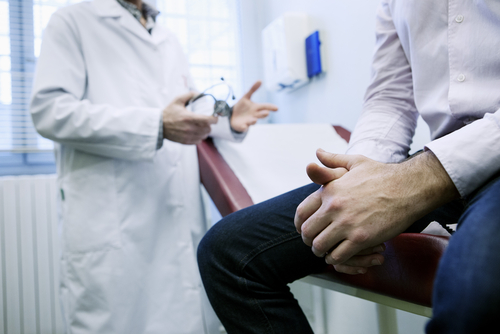Prostate cancer can be a delicate subject to say the least. But it’s important that men create open lines of communication with their physicians so that they are aware of the disease’s symptoms.
It’s the most common cancers among men (other than skin cancer) – and prostate cancer is one of the leading causes of cancer death in men, according to the American Cancer Society.
Early detection can be very beneficial in mitigating the damage done by some cancers, including of the prostate. The statistics show that while one in seven men are diagnosed with prostate cancer during their lifetime, only one in 39 will die of the disease. Prostate cancer cases that are detected early (while the cancer is still restricted to the prostate gland), have a much more favorable chance of survival.
There are even blood tests, such as prostate-specific antigen (PSA) testing, that can detect indicators of the disease. Seek the advice of a doctor who can explain preventive care and fill you in on what symptoms to be aware of.
Difficulty Urinating
One of the most common warning signs of prostate cancer is difficulty urinating. To understand why, one must comprehend the male anatomy. The urethra – the tube that carries both semen and urine, is surrounded by the prostate gland. When even the smallest tumor exists in the region, a man’s ability to urinate, stop urinating, or control the constant urge to urinate becomes a very real issue. By examining your prostate gland, your physician will be able to conclude if it is enlarged, infected, or contains cancerous cells.
Leaking Urine
Along these lines, leaking or dribbling urine is something to pay attention to. While it’s often mistaken as incontinence or overactive bladder, the presence of this symptom in tandem with the others is cause for concern. If you’ve experienced a leaking of urine when you laugh, cough, or before you get to the restroom, ask your physician about your risks of prostate cancer.
Pain Elsewhere in the Body
Sometimes the effects of prostate cancer are felt in other parts of the body.
Persistent pain, dullness, or a stiff feeling in the lower back, pelvis, and upper thighbones are all indicators that something is amiss.
When cancer spreads, it can transfer pain to surrounding areas of the body; this is known as “referred pain.” Think it’s hard to believe? According to one recent study, prostate cancer was 50 percent more common among men who reported having these sensations 10 years prior. This is just one of the many reasons why it’s so important to be in tune with your body, and never ignore symptoms even when they may seem unrelated.
Erectile Dysfunction
Blunders in the bedroom, or erectile dysfunction to be more specific, can be a warning sign of prostate cancer. Just as a tumor can put pressure on the urethra, it can become difficult for a man to maintain an erection when he has prostate cancer. In many cases, it’s the treatment, such as radiation, surgery or hormone adjustments that cause a residual effect of ED. For those suffering from erectile dysfunction, there are many medications on the market that can address the issue.
Blood in Semen
According to Mayo Clinic, the presence of blood in the semen (especially for men age 40 and over) is an early warning sign of cancer; this is especially true if the blood appears periodically
Regular checkups and preventive care are the keys to maintaining good health. Remember: if you catch prostate cancer in its early stages, there are many treatment options available to you. The CyberKnife Center of Miami is a state-of-the art facility that utilizes the most technologically advanced radiation therapy to destroy tumors with pinpoint accuracy and CyberKnife has a 98% success rate for treating prostate cancer. It is non-invasive, no cutting, no anesthesia, no pain and no downtime. For more information or to learn if you are a candidate for CyberKnife contact our office at 305-279-2900 or fill out our online form to schedule an appointment.

